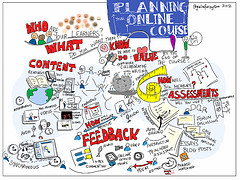Mark Greenfield, a long time veteran of the web and tech development and an economics major, has a message about the state of higher education: it’s broken.
In a talk at HighEdWeb 2013 titled “The Great Unbundling” Greenfield, of the University of Buffalo, laid out a startling case detailing how online learning is busting the Higher Education business model wide open.
Massively Open Online Courses are poised to steal (and in many cases already are) revenue from colleges that use big lecture hall classes to generate millions in revenues,” Greenfield said. And he questions whether lecture halls are becoming obsolete.
“I will argue with anyone that a well constructed MOOC is a better learning experience than a psych 101 class taught by a TA that doesn’t have any credentials to teach,” Greenfield said.
He notes that Bill Gates has predicted that “place-based” education is less important in the next 5 years. Greenfield expects hundreds of colleges in the U.S. may wind up closing in the coming years.
“It doesn’t matter where you live anymore. If I want to take a course with a Harvard professor, I can” Greenfield said, and its taught with the same rigor a student on campus might find.
Competition is leading to universities outsourcing key tasks. Everything from IT to Admissions could be outsourced or centralized, Greenfield predicts.
Even college courses could be “Unbundled” from their component parts. Who creates the course, who delivers the course and who grades the course, could all be different people in the new paradigm, Greenfield says.
The State University of New York is working with MOOC provider Coursera to deliver courses, and the chancellors office at SUNY has said that up to ⅓ of its 500,000 students could be earning credits from an online source.
The rise of free agent faculty could be next, Greenfield said. The founders of Coursera were well respect Stanford professors and they are now teaching more students than they ever did. Younger faculty who are having trouble finding tenure track positions at brick and mortar universities could also turn to MOOCs as a way to teach and reach many students.
The unbundling of higher ed also has the potential to fracture tradition notions of a four-year school, Greenfield said. Instruction could be adapted to speed up as students show more proficiency in a topic.
“What happens if the student you’ve learned matters more than time served?” Greenfield says.
For universities the question becomes who “owns” the student when they’ve taken courses at several different schools. That presents new challenges for alumni offices, students affairs and all
Change is a good thing Greenfield, argues and those changes are already here.
Image courtesy of Giulia Forsythe on Flickr via a CC license

